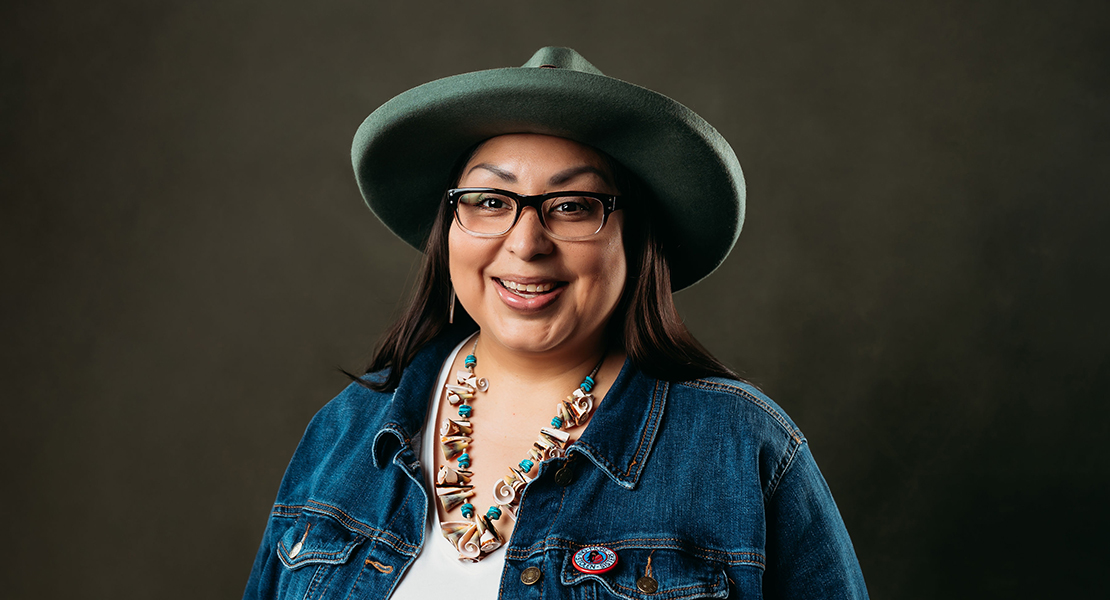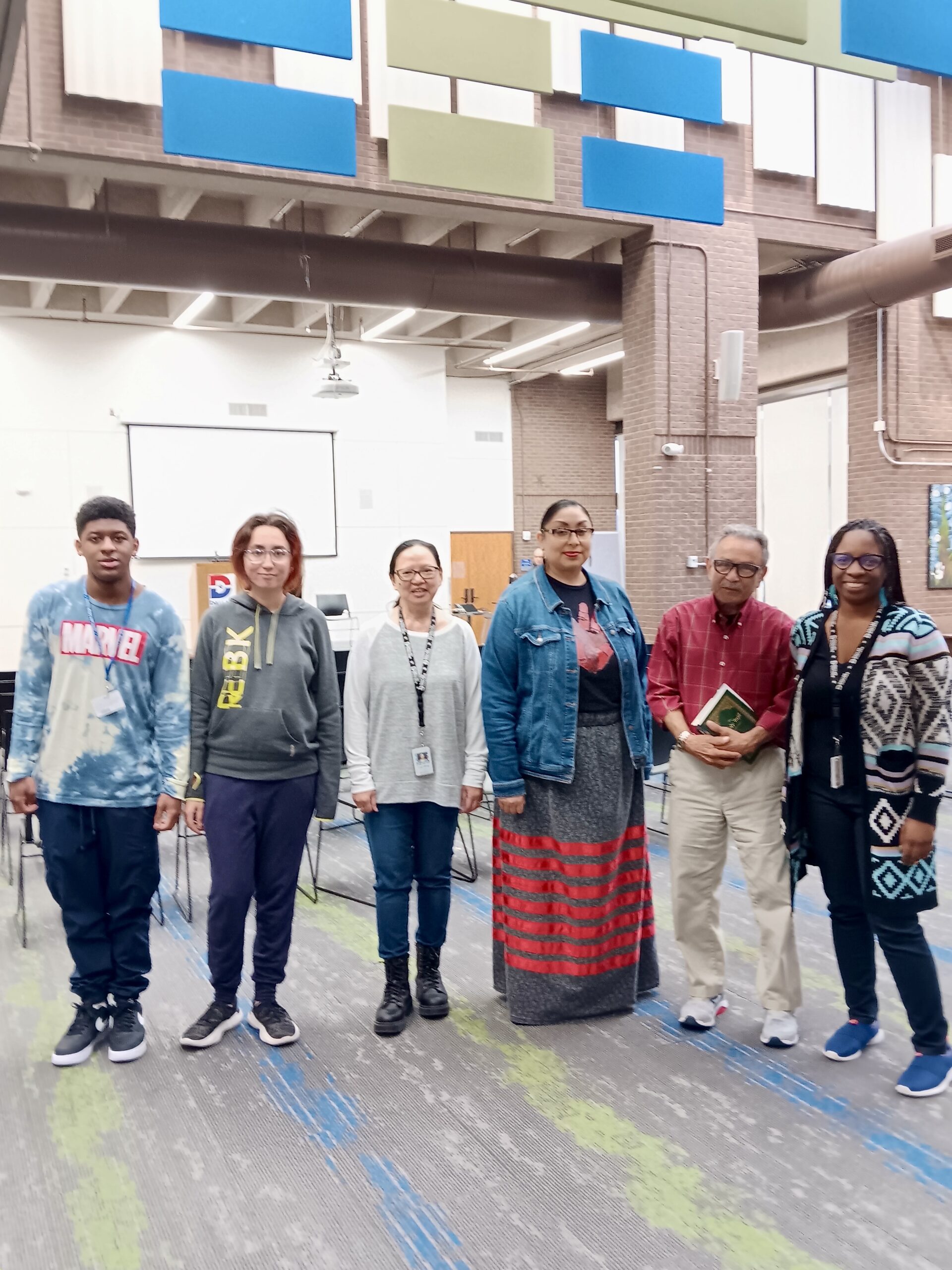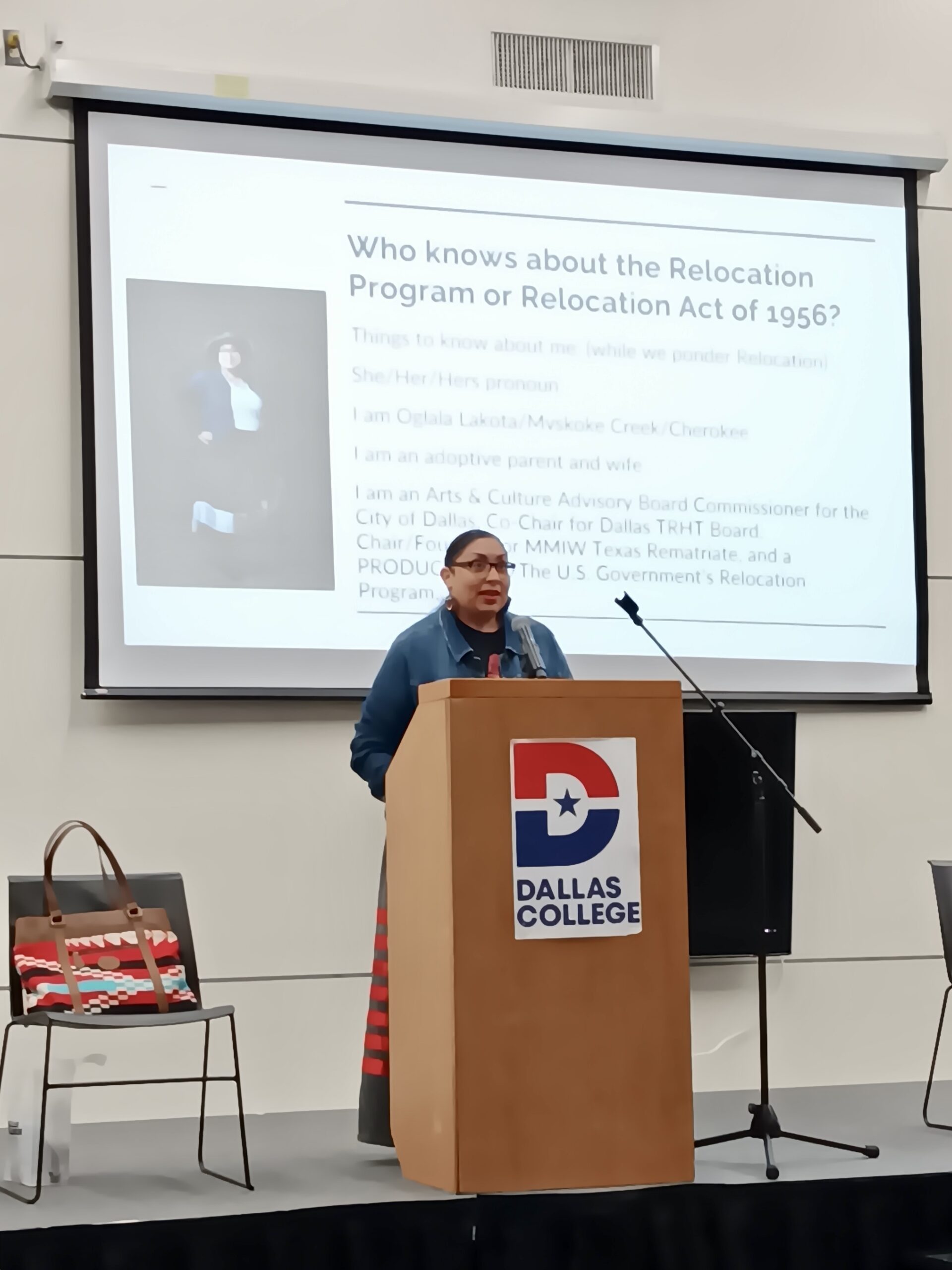Story by Lawson Martin Photos provided by Nasher Sculpture Center and Dallas College.

Jodi Voice Yellowfish, the chair of Missing and Murdered Indigenous Women (MMIW) Texas Rematriate, recently delivered a thought-provoking presentation at Dallas College. Her talk, “Native American Heritage: Through the Lens of an Urban Advocate,” blended personal experiences and historical insights.
Jodi spoke about her engagement in the city’s art scene and her broader commitment to community work. She focused on her connection to the relocation program and emphasized its impact on her life.
“I always state that I am a product of the relocation program and ask people if they know what it is,” Jodi says. “I asked if they knew what the relocation act was and if they knew Dallas was a relocation city. And often, you might have one or two people who understand it. Speaking with different audiences and working with non-native people, I ask if they know these things; very few ever do.”
 As an Indigenous advocate and activist, Jodi uses these moments to educate the public about important topics, such as the American Indian Urban Relocation Act. According to the National Archives, in the 1950s, the U.S. government’s Bureau of Indian Affairs implemented the termination policy, ending government support for Indian tribes and trust status for Indian-owned lands. In response, the BIA launched an urban relocation program, encouraging American Indians to move to metropolitan areas like Dallas.
As an Indigenous advocate and activist, Jodi uses these moments to educate the public about important topics, such as the American Indian Urban Relocation Act. According to the National Archives, in the 1950s, the U.S. government’s Bureau of Indian Affairs implemented the termination policy, ending government support for Indian tribes and trust status for Indian-owned lands. In response, the BIA launched an urban relocation program, encouraging American Indians to move to metropolitan areas like Dallas.
The transition was challenging for many relocated American Indians who faced unemployment, discrimination, homesickness, and loss of traditional cultural support.
“We’re off reservation. We’re off tribal lands, which means we represent a lot of different tribes,” Jodi says of Dallas. “Here in this major city, we represent hundreds of tribes, which allows me to say how unique every tribe is. Not only are we proud to have survived relocation and that act of assimilation, but we’re really thriving in that our cultures are alive, and we get to share those with each other.”
The National Archives says that when the urban relocation program began, around eight percent of American Indians lived in cities, but by the 2000 Census, about 64 percent resided in urban areas.
According to Jodi, there are hundreds of tribes within the Dallas area, which opens conversations and opportunities for learning from one another.
“The uniqueness of being in a relocation city really gives us this different kind of respect for each other and where we’re from,” she says.
Jodi emphasizes the need for individuals to delve into the diverse ways Native individuals identify themselves.
“If you identify as Indigenous or Native or American Indian – everyone has different reasons for how they identify themselves,” Jodi says. “We want people to know that we’re all different tribes.”
 As the chair of Missing and Murdered Indigenous Women (MMIW) Texas Rematriate, Jodi is dedicated to the organization’s mission of assisting families facing the crisis of a missing relative or loved one. According to MMIW, the American Indian Urban Relocation Act impacted the problem of missing and murdered Indigenous women because urban-dwelling American Indians did not have as many ties to tribal law enforcement or allies.
As the chair of Missing and Murdered Indigenous Women (MMIW) Texas Rematriate, Jodi is dedicated to the organization’s mission of assisting families facing the crisis of a missing relative or loved one. According to MMIW, the American Indian Urban Relocation Act impacted the problem of missing and murdered Indigenous women because urban-dwelling American Indians did not have as many ties to tribal law enforcement or allies.
MMIW serves as a vital support system, helping families navigate the complexities of media interactions and talking to law enforcement during these traumatic situations.
“We help families navigate media and talk to law enforcement because these things can be very triggering and traumatizing, and when you’re in crisis, you’re not thinking straight,” Jodi says. “So we are really this buffer and support for these families.”
Jodi’s involvement in this advocacy work stems from a personal connection to a case that deeply affected her. This case prompted her to channel her passion into building an organization that could address the crucial needs of her community. Born and raised in the community, Jodi’s local roots contribute to a high level of trust, allowing her to establish connections and serve as a valuable resource to those in need.
During her presentation, Jodi said a significant point of reflection was how she could reconnect with her culture and reclaim aspects of her family’s history. This was a grounding force for her, especially given her current advocacy work responsibilities.
The U.S. Department of Interior honors National Native American Heritage Month every November to celebrate the traditions, languages, and stories of Native American, Alaska Native, Native Hawaiian, and affiliated island communities. The Department says it is continuing to acknowledge “the impact that relocation, forced assimilation, and lack of critical funding has on Indigenous communities across the country.”
The department wrote on its website, “We are committed to elevating those issues while empowering tribal governments and Indigenous peoples.”
In November and every month, Jodi emphasizes moving beyond awareness of Native Americans and Indigenous people to actual, tangible action. When speaking to a group, Jodi encourages non-native audiences to reflect on their new knowledge and consider practical steps they can take in their everyday lives. She outlines critical principles for being a healthy ally, urging people to be patient and listen actively.
“I let people know it’s easier than you think to connect with a community,” Jodi says. “It just takes knowledge and learning more about the crisis and situations going on, and actively taking that step.”
Jodi feels that many people are unaware of how many Native people reside in cities rather than on a reservation or tribal lands. That’s why her mission to spread awareness is so crucial.
“Many non-native people do not know that they’re probably going to school with and working with Native people, and they may employ Native people,” Jodi says. “They may be caring for Native people as a healthcare worker or a social worker. One of the biggest obstacles is not knowing how to care for that population respectfully.”
Jodi sees education as a solution to this.
“That’s why I jump at every chance to educate and to speak with people,” Jodi says.
Dallas College invited Jodi to speak to students, staff, and the public to educate individuals about Indigenous people and their cultures. Jodi spoke in person at Dallas College’s North Lake campus, and her speech was live-streamed to all other campuses.
Alexandria Gurley, a coordinator with the Multicultural Affairs office at Dallas College, says Jodi’s speech was an important event for students to learn historical facts about Native Americans that may not be covered in their regular coursework. Alexandria feels Jodi’s presentation prompted students to recognize the importance of acknowledging the present and thriving cultures of Indigenous people.
According to Alexandria, Dallas College has a relatively small percentage of Indigenous and American Indian students, so she says it’s essential for Dallas College students to make intentional efforts to learn about cultures that may not be similar to their own.
“It’s important to spread the word and have people learn more and not culturally appropriate aspects of a culture,” Alexandria says.
Alexandria says Dallas College’s Multicultural Affairs office aims to encourage students and staff to be more inclusive, culturally competent, and diverse leaders both on and off campus.
Alexandria says, “This particular event aligns with our work to help folks be more equitable and inclusive.”
To learn more about Jodi and her advocacy efforts, click here to follow her on Instagram.
Sign up with your email address to receive good stories, events, and volunteer opportunities in your inbox.